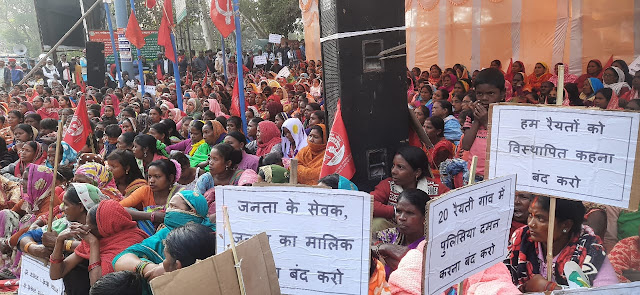The Bokaro Grameen Raiyat Adhikar Morcha (Bokaro Rural Landowners Rights Front) organised a huge rally and general assembly in Bokaro Steel City (Jharkhand) on 10 January 2023. The rally began from Naya More after garlanding the statue of Birsa Munda. The rally, attended by displaced people from 20 maujas (a cluster of villages), culminated into a huge general assembly outside the Deputy Commissioner’s office.
The rally and the assembly was addressed by former MP from Bankura Basudeb Acharia, former MLA from Nirsa Arup Chatterji, Haldhar Mahto (general secretary, Marxist Co-ordination Committee), DC Gohain (Jharkhand Krantikari Majdur Union), Bacha Singh (Convenor, Jharkhand Jan Sangharsh Morcha) and others. The leaders demanded recognition of the rights of the villagers of 20 maujas from the government and administration.
The people of these 20 displaced maujas of Bokaro (Jharkhand) are fighting for their land rights since the last 5 decades. Generation after generation of these villages have fought against the unjust acquisition of their land by the government. Governments have changed; their villages which once belonged to Bihar are now in the jurisdiction of Jharkhand state, but their struggle rages on.
Political parties of all shades have supported the struggle of these people at some point or the other. But once in power, they have either ignored the issues of the displaced or have made it worse.
According to Arbind Kumar, youth leader of the Bokaro Grameen Raiyat Adhikar Morcha, Bokaro Steel Plant and city was built in the 1960s after acquiring lands in these areas. Hundreds of villages were displaced, and forest and community land was diverted for this mega-project.
These acquisitions happened on the basis of the draconian 1894 Land Acquisition Act. While, many villages were rehabilitated or compensated, villages of these 20 maujas who are protesting till today were left out of the process.
These villages initially received some meagre compensation but were left to fend for themselves after the plant was built. The villagers continued to live in their original villages. In 1973, the administration of the Bokaro Steel Plant declared that they don’t need the land of these villages anymore as they already had surplus land.
But, despite declaring these lands as surplus, raiyats (landowners) from these villages like Kundori, Shibutand, Pachora, Baidmara, Basteji, Agardih, Pipratand, Mahuad etc. were never returned their legal ownership.
This is the root of their problems. While on the surface, rural inhabitants continue to live and work in these areas, their land rights are not officially recognised. As a result, new controversies keep erupting every now and then.
On 24 September 2022, 16 houses were demolished in Dhangari village for expansion of railway line by railway authorities. Protests of villagers against these demolitions were dealt with severe police repression. Railways authorities claimed that the land was given to them by Bokaro Steel administration. The people living in these houses were deemed as “illegal encroachers”.
Protestors have fought tooth and nail against this bureaucratic conspiracy and have started an indefinite strike in the village. Additionally, they have filed a legal case and continue to meet both railway and Bokaro Steel officials.
The rally and assembly of 10 January 2023 was another attempt by these villagers to raise their plight in front of the government. The fate of these villagers hangs in uncertainty. Under the banner of Bokaro Grameen Raiyat Adhikar Morcha and with support of Left organisations, they have presented a charter of demands:
- To restore the status of these areas as villages under Panchayat system.
- To return legal ownership of unused land to rightful raiyats according to land laws of the country.
- To give these villagers identity proofs of income, residence, and caste certified by higher authorities.
- To restore these villages on government maps that currently shows these areas as unoccupied.
The plight of the 20 maujas of Bokaro, their resilient struggle and reasonable demands are a lesson for the future of India. They serve as an example of the consequences of mindless urbanization at the cost of rural lands and livelihoods. This issue also reveals the complex relation between land rights and citizenship.
According to Kamaluddin Khan, committed social activist and member of the Bokaro Grameen Raiyat Adhikar Morcha, these villagers have become aliens in their own land. The government can come and demolish their houses without any due process like they did on 24 September.
Khan asked that if the railway authorities and local administration have the power to surround them with armed police, why they can’t show us the papers that were required by the law? Repeated requests by the displaced villagers to railway authorities and local administration for adequate papers and documents have not been met.
Members of the the Bokaro Grameen Raiyat Adhikar Morcha have demanded that officials who were engaged in this illegal demolition must be suspended as they have failed to show any evidence that they have followed the due process of law.
Courtesy: counterview.net


